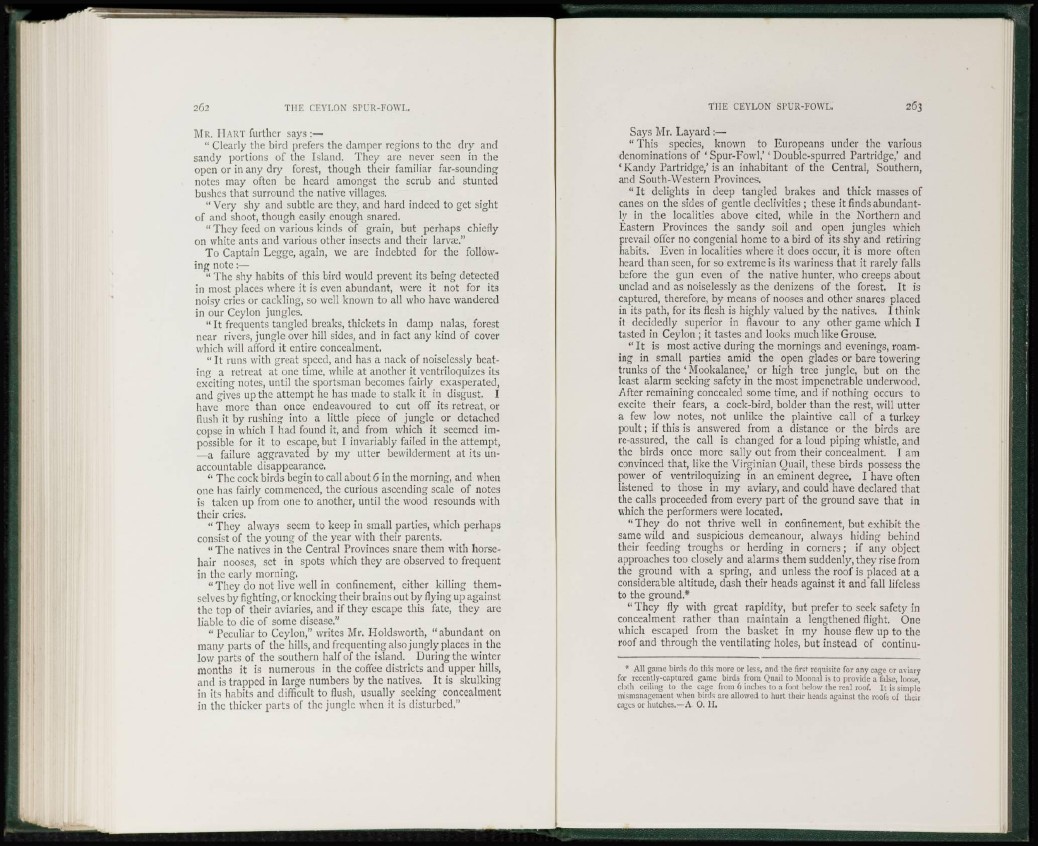
MR. HART further says:—
" Clearly the bird prefers the damper regions to the dry and
sandy portions of the Island. They are never seen in the
open or in any dry forest, though their familiar far-sounding
notes may often be heard amongst the scrub and stunted
bushes that surround the native villages.
" Very shy and subtle arc they, and hard indeed to get sight
of and shoot, though easily enough snared.
" They feed on various kinds of grain, but perhaps chiefly
on white ants and various other insects and their larvae."
To Captain Lcgge, again, we are indebted for the following
note :—
" The shy habits of this birtl would prevent its being detected
in most places where it is even abundant, were it not for its
noisy cries or cackling, so well known to all who have wandered
in our Ceylon jungles.
" It frequents tangled breaks, thickets in damp nalas, forest
near rivers, jungle over hill sides, and in fact any kind of cover
which will afford it entire concealment.
" It runs with great speed, and has a nack of noiselessly beating
a retreat at one time, while at another it ventriloquizes its
exciting notes, until the sportsman becomes fairly exasperated,
and gives up the attempt be has made to stalk it in disgust. I
have more than once endeavoured to cut off its retreat, or
flush it by rushing into a little piece of jungle or detached
copse in which I had found it, and from which it seemed impossible
for it to escape, but I invariably failed in the attempt,
—a failure aggravated by my utter bewilderment at its unaccountable
disappearance.
" The cock birds begin to call about 6 in the morning, and when
one has fairly commenced, the curious ascending scale of notes
is taken up from one to another, until the wood resounds with
their cries.
" They always seem to keep in small parties, which perhaps
consist of the young of the year with their parents.
"The natives in the Central Provinces snare them with horsehair
nooses, set in spots which they are observed to frequent
in the early morning.
"They do not live well in confinement, either killing themselves
by fighting, or knocking their brains out by dying up against
the top of their aviaries, and if they escape this fate, they are
liable to die of some disease."
" Peculiar to Ceylon," writes Mr. Holdsworth, " abundant on
many parts of the hills, and frequenting also jungly places in the
low parts of the southern half of the island. During the winter
months it is numerous in the coffee districts and upper hills,
and is trapped in large numbers by the natives. It is skulking
in its habits and difficult to flush, usually seeking concealment
in the thicker parts of the jungle when it is disturbed."
Says Mr. Layard :—
" This species, known to Europeans under the various
denominations of ' Spur-Fowl,' ' Double-spurred Partridge,' and
' Kandy Partridge,' is an inhabitant of the Central, Southern,
and South-Western Provinces.
" It delights in deep tangled brakes and thick masses of
canes on the sides of gentle declivities ; these it finds abundantly
in the localities above cited, while in the Northern and
Eastern Provinces the sandy soil and open jungles which
prevail offer no congenial home to a bird of its shy and retiring
habits. Even in localities where it does occur, it is more often
heard than seen, for so extreméis its wariness that it rarely falls
before the gun even of the native hunter, who creeps about
unclad and as noiselessly as the denizens of the forest. It is
captured, therefore, by means of nooses and other snares placed
in its path, for its flesh is highly valued by the natives. I think
it decidedly superior in flavour to any other game which I
tasted in Ceylon ; it tastes and looks much like Grouse.
" I t is most active during the mornings and evenings, roaming
in small parties amid the open glades or bare towering
trunks of the ' Mookalanee,' or high tree jungle, but on the
least alarm seeking safety in the most impenetrable underwood.
After remaining concealed some time, and if nothing occurs to
excite their fears, a cock-bird, bolder than the rest, will utter
a few low notes, not unlike the plaintive call of a turkey
poult; if this is answered from a distance or the birds are
re-assured, the call is changed for a loud piping whistle, and
the birds once more sally out from their concealment. I am
convinced that, like the Virginian Quail, these birds possess the
power of ventriloquizing in an eminent degree. I have often
listened to those in my aviary, and could have declared that
the calls proceeded from every part of the ground save that in
which the performers were located.
" They do not thrive well in confinement, but exhibit the
same wild and suspicious demeanour, always hiding behind
their feeding troughs or herding in corners; if any object
approaches too closely and alarms them suddenly, they rise from
the ground with a spring, and unless the roof is placed at a
considerable altitude, dash their heads against it and fall lifeless
to the ground.*
" They fly with great rapidity, but prefer to seek safety in
concealment rather than maintain a lengthened flight. One
which escaped from the basket in my house flew up to the
roof and through the ventilating holes, but instead of continu-
* All game birds do this more or less, and the first- requisite for any cage or aviary
for recently-captured game birds from Quail to Moonal is to provide a false, loose,
cloth ceiling to the cage from 6 inches to a foot below the real roof. It is simple
mismanagement when birds are allowed to hurt their- heads against the roofs of their
cages or hutches.—A O. H.